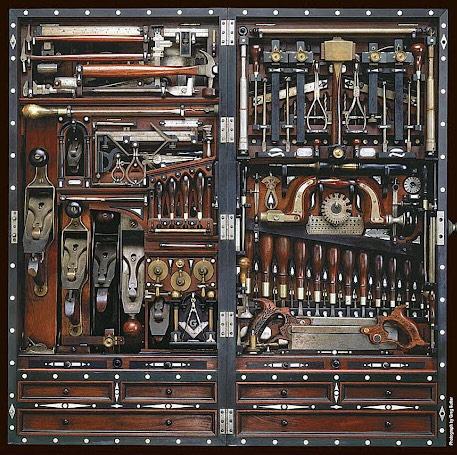A little while ago, Tony Weed detailed some of the resources and software tools he and his colleagues in Web Development use to make getting work done a bit more effective. Today, I’d like to share with you some of the software add-ons and tools that help me get through my digital work. (And no, I’m not nearly as organized as that classic woodworking toolbox in the header image might suggest!)
Organizing my thoughts
First, I subscribe to the “Getting Things Done tm” (GTD) approach to managing to do’s and tasks promulgated by David Allen. You can learn more about this way of organizing with a LinkedinLearning video about the subject. To help me with this, I use a To Do List Manager. There are any number of these out there, but the one I use is Things 3 by Cultured Code. Since I spend most of my time on Apple devices, this tool has the interface I find easiest to use. It allows me to get my ideas about what I need to do out of my head and stores them in an organized way so I don’t forget to do things. And it’s easy to organize and re-order things as needed.
If you work on a Windows machine, you may prefer a cross platform tool like Todoist, or Google Tasks, which I used until they got rid of hierarchical organization (a crucial feature, in my opinion). And there are all sorts of Kanban style organizational tools out there to test out for project and personal management.
Managing passwords
One other crucial tool to our ever increasingly digital lives is a good password manager. The College supports Keeper, and I also use the free version of the open source tool BitWarden. Any of these tools works across platforms and devices, and lets you store complicated (good) passwords securely. This frees you from having to remember all those passwords, and helps you not use the same easy to remember password everywhere you need to use one. (Which is a huge security vulnerability!) The best password managers integrate with your browsers, if you want, and simplify the process of logging into all the different sites we need to access in our professional and personal lives.
Browsers & extensions
I also use a number of different browsers, including Chrome, Safari, Firefox, Opera and when forced, Microsoft Edge. One critical habit here is to keep separate browsers for your daily surfing and for your online financial transactions. And it’s a good idea to regularly remove all cookies and clear out your browser cache to prevent sites from continuing to track your browsing across the web. Let me also give a plug here for the 6th browser I use, DuckDuckGo, which is both a search engine and a browser, and promises not to track you all over the internet!
Within my primary browser, Chrome, I also use a number of extensions to make browsing more efficient. That includes an Ad Blocker (Adblock Plus), as well as Privacy Badger, which is a tool that looks out for my privacy around the web by blocking otherwise invisible trackers, as well as an extension for my password manager. I also use a tool to help me corral my tab explosions, called OneTab Plus, which helps convert all open tabs into an easy to access list.
Handling text
As does my colleague Les Leach, I also use BBedit from Bare Bones Software to manage textual content, strip out strange characters that haunt word processor documents, and to make sure I am copying and pasting just the actual text I need to work with, not a bunch of extraneous code along with it. It’s also great for testing out code snippets, and comparing text side-by-side, if you have a larger screen.
Other tools
Some other tools I use, if less often include Omni Groups OmniGraffle, which is great for diagramming things, and OmniOutliner, which is a very intuitive outline creation tool. I’m less enthusiastic about their to-do list manager. I also use a tool called Synergy, to allow me to share a single keyboard and mouse while working on more than one computer simultaneously.
Backup
While the College supplies a great backup tool for your desktop and laptop computer called CrashPlan, that backs up to storage in the cloud, I also use a separate tool, Carbon Copy Cloner by an Apple Engineer, Mike Bombich (great guy, btw) to make personal backups of my files to a portable hard drive.
Costs and sharing
Please note, many of these tools are paid licenses or subscriptions, but some have free versions that you can try out. In every case, I encourage folks to step back and ask whether there are parts of how they do things that are tedious, or might benefit from something to take some of the burden off, and help you make your work on your computer more effective, and more secure. Please share with us the tools that you find useful add-ons to your software suites!

